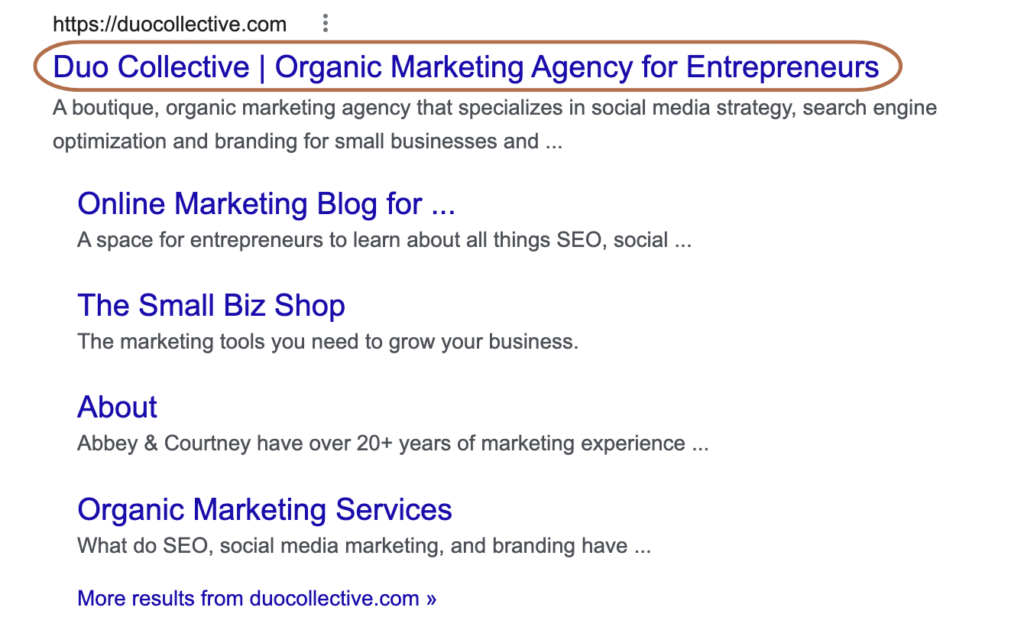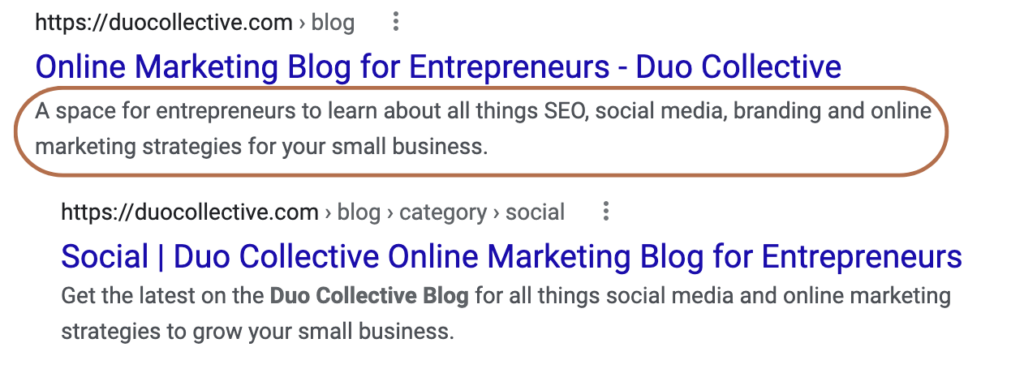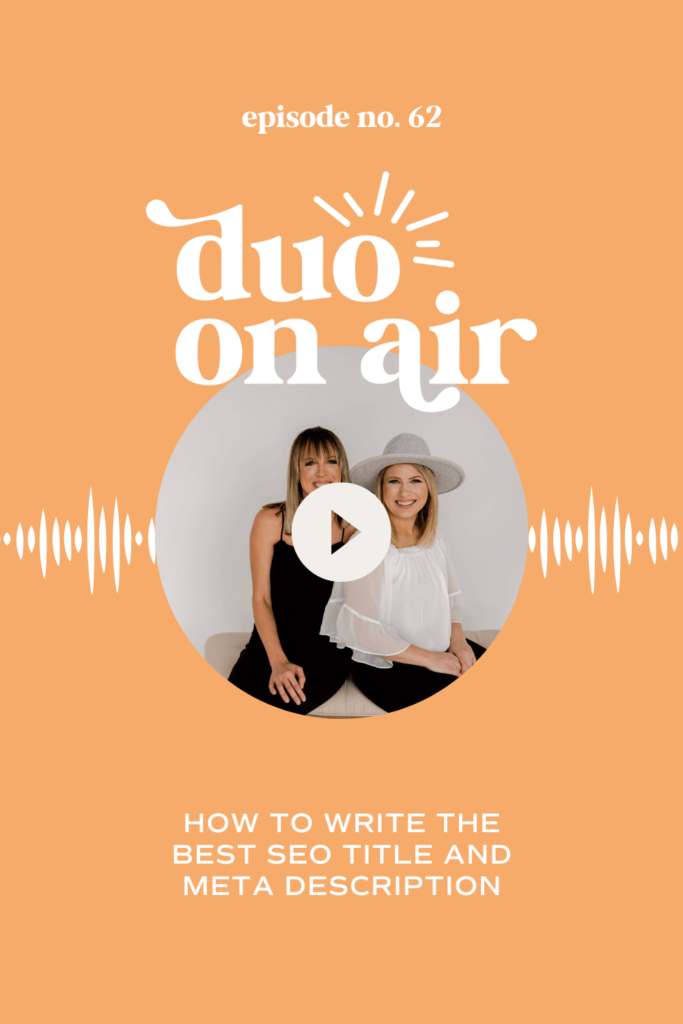Apple Podcasts | Spotify
Even if you have an optimized website, the best keywords, and a perfect content strategy, you might be missing these two crucial things for your business’ success! If you don’t have an enticing SEO title or engaging meta description accompanying your content, the chances of your website being seen (let alone ranking on search engines) falls drastically.
Imagine you are looking at a Google Search Engine page. Each result you see has a blue headline and black subtext underneath. That blue headline is your SEO title and the black text underneath is called your meta description. Each and every page on your website has it’s very own SEO title and meta description. And yes, you should absolutely be writing this yourself not letting your website provider automate this. The automations are great when set up correctly, but what we usually find is that these titles and descriptions will end up being way too long.
Your title is the first thing your audience will see, so it needs to be eye-catching! If you don’t know how or struggle to write compelling SEO titles and meta descriptions, look no further! We’re here to help make it happen.
What is an SEO Title?
Think of your SEO title like a paid ad. How can this headline entice a click? An SEO title is one of the most important aspects of your website content, so it needs to be attention-grabbing to draw in your audience.

When you type in “duo collective blog” into Google, you’ll get a result like this. Here, you can see that our SEO title is specific and entices readers to click. The meta description isn’t too repetitive, either. It specifies what our business is, what we offer, and who might be looking for our services.
We suggest writing your SEO title to be 50-60 characters so your entire title will show up on the SERP. As you compose your SEO title, make sure to incorporate keywords about your business and the services you offer as early as possible. Relevant keywords ensure that your title answers what people are searching for. It also helps your website rank on search engines.
Your SEO title needs to be readable, which means using title case to stand out. It should have proper grammar, spelling, and capitalization. Error-riddled SEO titles aren’t inviting because they aren’t readable or credible to your audience or search engines.
Quick Tip: Leverage characters like the vertical line and ampersand to help save space!
Another question we get all the time is when to use your brand name in an SEO title. The answer is definitely not everywhere. We suggest only using it on your home page because it’s likely people aren’t searching for your brand name. They want the solution you provide! For blogs, don’t use your brand name at all; focus on the question you’re answering with the content.
Our favorite SEO title “equation” is: Keywords + Context / Urgency + Brand
SEO titles are just one thing you need to include for your content to be successful. Don’t forget the meta description! It’s just as essential as the title.
What is a Meta Description?
Your meta description should elaborate on your title or provide more context to what’s on the webpage. Meta descriptions that represent your content well encourage your audience to click on the search result, which will help boost your website’s ranking. Your SEO title should grab your audience’s attention, and the meta description should get them to click on the result.

Here, you can see the circled part is the meta description for our website. We formulated it to include important keywords detailing our services and what we can do for our target audience.
Don’t treat meta descriptions like a social media caption or intro to a blog post. There isn’t much space for the description when it shows up on a SERP, so every word counts! Make sure you include keywords about your business/services, who you are, or where you’re located. Meta description should be 155-160 characters, which can fit almost everything you need on those two lines of the SERP.
Our favorite meta description “equation” is: Keywords + Pain Point / Benefit + Call to Action
Your SEO title and meta description should complement each other, but they shouldn’t be repetitive! If both contain relevant (but different) information about your business and website, then it will drive traffic and engagement to your website.
How to Write the Best SEO Title and Meta Description
It might seem like there are a lot of rules to master when writing great SEO titles and meta descriptions, but it isn’t too hard! This is something we want you to remember because this is going to take all the stress away from this little SEO optimization.
SEO titles are a ranking factor.
Meta descriptions are NOT a ranking factor.
This has actually been confirmed by the head of search at Google! Although it’s best practice to use keywords in your meta description, it’s not going to affect where you rank on the page.
Here are a few best practices we use when we write our own.
Utilize Online Tools
These are some of our favorite tools to use when writing these two things for our clients.
- MRS Digital when we are writing this ourselves
- AI tools. Ubersuggest has a brand new one under their Labs tab and you can get a personalized writer for things like SEO titles, meta descriptions, headlines, and more.
- We also love to use ChatGPT. We ask it to give us 5 options of meta descriptions for a web page in this industry, using this keyword. Be specific!
Keywords
We’ve touched a bit on this already, but we can’t stress enough how important it is to use keywords in your titles and descriptions. A LOT of SEO success depends on the keywords used to drive traffic and build online visibility.
The best way to incorporate keywords into your titles and descriptions is to research some relevant to your business. These keywords should ideally have a high search volume and low to medium competition. These types of keywords help your website compete and rank on search engines.
Level of Detail
Next, your titles and descriptions should hit the right balance of simple and descriptive. A nonexistent title or description will do nothing (or possibly hurt) your business’ search rankings. SEO titles and meta descriptions that are too simple aren’t compelling enough to pull in your audience because it lacks context and relevance. An SEO title and meta description with too much detail usually have more information than the character limits allow.
If titles are too long, they’ll trail off into ellipses. Ellipses aren’t always a bad thing, but your audience is less inclined to click on the search result of your business if the title or description doesn’t address their search inquiry right off the bat.
A well-written SEO title has keywords, context, or urgency to click on your website and your brand. An effective meta description should have keywords, an audience pain point you’re resolving or a benefit they get from your content, and a call to action to encourage them to click on the result.
If you have to take away one lesson, let it be this: Keywords take priority! So much of your SEO success hinges on the keywords you use, so make sure they’re relevant to your business.
Understand SEO
You don’t have to stop at the basics to craft an amazing SEO title and meta description. Did you know that we offer an SEO coaching program? Learning about SEO is one of the best ways to increase your website’s organic traffic and improve your business’s online presence. We know how important SEO is for digital marketing, so we created this program to help you build this skillset!
Over the course of this 6-week program, you’ll learn SEO basics and beyond (yes, this includes SEO titles and meta descriptions!) We get into keyword searching, website optimization, best design and copy practices, SEO on social media, and more! Also, you’ll have access to SEO help through your coaches and peers who join the program.
Ready to hop in the program? Join the waitlist (or if you’re lucky and the program is open, join today!) We’d love to have you join us! Fair warning, these spots fill up fast, so you’ll want to sign up as soon as you can.
25 SEO Title and Meta Description Examples
Let’s look at these best practices in action! We’ve highlighted the keywords within each to show you how you can naturally include them in your SEO title and meta description. Plus, we have a few examples of the blogs we have about these topics!
1. Title: What Is a Fractional CMO? (And Why You Might Need One)
Meta: Find out what a fractional CMO does and how hiring one can elevate your marketing without the cost of a full-time executive.
2. Title: How to Improve Website Speed to Boost Your SEO
Meta: A fast site means better rankings. Learn simple ways to improve website speed and SEO performance.
URL: https://duocollective.com/blog/website-page-speed-why-it-matters
3. Title: The Role of Internal Linking in Your SEO Strategy
Meta: Improve your rankings and keep users engaged with smart internal linking. Here’s why it matters for SEO.
4. Title: The 3 Types of Logos Every Business Needs (And How to Use Them)
Meta: Learn about primary, secondary, and submark logos—and why using all three types of logos can make your brand more cohesive.
5. Title: How to Build Trust Online Without Spending a Dime on Ads
Meta: Discover authentic ways to build trust online, grow your audience, and drive leads using organic content marketing.
6. Title: When to Outsource as a Solopreneur (And Who to Hire First)
Meta: Feeling maxed out? Here’s how to know when to outsource and what roles will make the biggest impact.
URL: https://duocollective.com/blog/how-to-let-go-and-outsource
7. Title: What Is Organic Marketing? A Simple Guide for Solopreneurs
Meta: Learn how to grow your business online without paid ads by using intentional, value-driven organic marketing strategies.
8. Title: How to Write SEO-Friendly Blog Posts That Actually Rank
Meta: Use this step-by-step process to write SEO-friendly blog posts that rank on Google and drive long-term organic traffic.
9. Title: The Power of Brand Storytelling (And How to Craft Yours)
Meta: Connect deeper with your audience in an authentic, strategic way with brand storytelling.
10. Title: What Is a 301 Redirect? (And Why It Matters for Your SEO)
Meta: A simple explanation of a 301 redirect and how they help preserve SEO when updating or moving web pages.
11. Title: 3 Organic Marketing Mistakes You Might Be Making (And How to Fix Them)
Meta: Avoid these common organic marketing mistakes and learn how to get better results from your content.
12. Title: How to Set Aligned Business Goals You’ll Actually Stick To
Meta: Ready to set business goals that feel good and move the needle? Here’s a fresh approach to business planning.
13. Title: How to Set Up SEO in Showit (Even If You’re Not a Techie)
Meta: A beginner’s guide to optimizing for SEO in Showit—no coding or tech overwhelm required.
14. Title: How to Choose Fonts That Align With Your Brand Personality
Meta: Your fonts say more than you think. Here’s how to choose typography that supports your brand personality.
URL: https://duocollective.com/blog/choosing-a-font-for-your-brand
15. Title: How to Market Your Business Without Feeling Salesy
Meta: Want to show up without sounding pushy? Learn how to market your business with storytelling, not pressure.
16. Title: Time Management Tips for Creatives: How to Work Smarter, Not Harder
Meta: Struggling with time as a solopreneur? Try these time management tips to get more done with less stress.
17. Title: Our Favorite Books for Female Entrepreneurs
Meta: We are huge readers and have compiled the best list of books for female entrepreneurs! Add them to your TBR.
URL: https://duocollective.com/blog/our-favorite-books-every-female-entrepreneur-must-read
18. Title: DIY Branding vs. Hiring a Designer: Which One Is Right for You?
Meta: Should you go with DIY branding or hire a pro? Here’s how to decide based on your business stage and goals.
19. Title: The Best Free SEO Tools for Small Business Owners
Meta: Want better rankings without a big budget? Here are the top free SEO tools to help boost your visibility.
URL: https://duocollective.com/blog/seo-tools-for-small-businesses-we-use-and-love
20. Title: How Long-Form Content Builds Authority in Your Niche
Meta: Ready to become the go-to expert? Here’s why long-form content builds trust and ranks higher.
21. Title: How to Set Boundaries With Clients as a Creative Business Owner
Meta: Boundaries are key to sustainability. Here’s how to set boundaries with clients without guilt or fear of losing business.
22. Title: How to Optimize Images for SEO Without Slowing Down Your Site
Meta: Learn how to optimize images for SEO to make your site load fast and rank higher.
23. Title: How to Create a Mood Board for Your Brand
Meta: A mood board for your brand helps bring your vision to life. Learn how to make one that sets the tone for your branding.
URL: https://duocollective.com/blog/what-is-a-brand-moodboard
24. Title: How to Batch Content Without Losing Your Mind
Meta: Batch working = freedom. Learn how to batch content and create a week’s worth of content in a day (and still love the process).
25. Title: The Biggest Myths About Entrepreneurship And the Truth Behind Them
Meta: Entrepreneurship isn’t always what Instagram makes it look like. Let’s talk about the myths about entrepreneurship and go BTS.
Starting to get the hang of it? Writing an SEO title and meta description doesn’t have to be complicated!
Writing High-Quality SEO Titles and Meta Descriptions for Your Biz
One final piece of advice: If you update any of these, be sure to request a manual recrawl in Google search console. This helps Google index your new data and serve it to people faster.
We can’t stress enough how crucial compelling SEO titles and meta descriptions are for your business’s online visibility and organic traffic. We hope these tips and tricks gave you some guidance on crafting the best titles and descriptions! If you need SEO help beyond SEO titles and meta descriptions, let’s work together! We love helping entrepreneurs and businesses improve their SEO and reach their goals. Contact us today to get started on crafting your personalized SEO strategy today!
If you liked today’s episode on The Duo On Air Marketing Podcast, don’t forget to leave us a review & subscribe!

More From The Duo
Sign Up for Tuesday Tips and Sips Newsletter
Abbey Oslin and Courtney Petersen are Minnesota-based marketing experts, educators, and co-founders of boutique marketing agency Duo Collective, which specializes in SEO, social media strategy, and branding for small business owners and creative entrepreneurs. To learn more about Duo Collective, or to inquire about working with our team, head over to www.duocollective.com.
To inquire about being a guest on Duo On Air, please fill out this application form.
And to submit a topic or a question for next week’s episode, send us a DM on Instagram! See you on Monday!


Great insights on crafting SEO titles and meta descriptions! I especially appreciated the tips on keyword placement and making the descriptions engaging. Can’t wait to implement these strategies in my own content!
This post is incredibly helpful! The examples you provided really clarify how to effectively craft SEO titles and meta descriptions. I especially appreciated the tips on incorporating keywords without making them sound forced. Thanks for sharing such practical insights!
So glad you liked it!
This blog post was incredibly helpful! I love the examples you provided for crafting effective SEO titles and meta descriptions. The tips on using keywords naturally and keeping within the character limits are particularly useful. I can’t wait to apply these strategies to my own content! Thanks for sharing!
Great tips! I found the examples really helpful in understanding how to craft compelling SEO titles and meta descriptions. Can’t wait to implement these strategies on my own site. Thanks for sharing!
Great insights! I especially loved the examples you provided; they really clarify the concepts. The tips on using keywords effectively in SEO titles were super helpful. Can’t wait to implement these strategies in my own blog!
This post is super helpful! The examples you provided really clarify how to create effective SEO titles and meta descriptions. I’ve struggled with this in the past, but now I feel more confident in applying these techniques. Thanks for sharing!
Great tips! I loved the examples you provided; they really helped clarify how to create effective SEO titles and meta descriptions. I especially appreciated the emphasis on incorporating keywords naturally. Thank you for sharing this valuable information!
This post is super helpful! I love the examples you provided; they really give me a clearer idea of how to craft my own SEO titles and meta descriptions. Can’t wait to implement these tips on my website! Thank you!